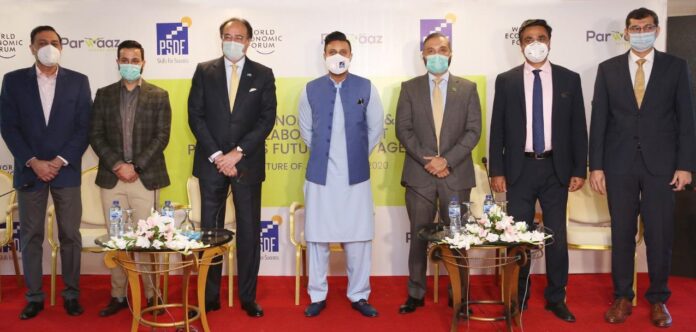Pakistan and World Economic Forum have partnered to launch ‘Parwaaz’, a national accelerator that looks to close the skill gap and create employment opportunities in the country.
The Punjab Skills Development Fund (PSDF) serves as the secretariat for Parwaaz.
Special Assistant to PM on Overseas Pakistanis and Human Resource Development Syed Zulfiqar Bukhari, along with HBL President & CEO Muhammad Aurangzeb, Engro Corporation President & CEO Ghias Khan, Telenor Pakistan CEO Irfan Wahab Khan, held a press conference on Thursday to discuss the future of jobs in Pakistan in light of a WEF report.
Pakistan has been featured in the WEF’s ‘Future of Jobs’ report for the first time. The Pakistan chapter showcased jobs and skills of the future, highlighting Pakistani employers’ perspectives on new job roles and skills that require attention and investment in the country in the age of technology and automation. The report features in-depth information on 15 global industries and 26 advanced and emerging countries.
Bukhari said the government’s job is not only to provide jobs but also to govern and chalk out policies. It is the responsibility of the government to provide a better environment for the private sector to create more jobs, he added.
At present, the market is full of young people with old skills that have little or no use today, he said. “Young people now need to learn new skills.”
Parwaaz brought Pakistan into the global conversation on skills and the future of work by facilitating WEF with an extensive employers’ based survey conducted with over 50 top Pakistani companies and business leaders across 6 priority sectors. The profile on Pakistan provides a detailed snapshot of the future readiness of the workforce in the country.
The report’s insights reveal that in Pakistan, of the over 82 million working age population, 50pc on average have requisite digital skills, 51pc have business relevant skills, and almost 55pc have acquired education with business relevance. While this looks promising for an emerging country, large challenges remain with 31pc youth not featured in employment, education, or training, and 55pc of the working age population in vulnerable employment.
The results of the Pakistan survey do however have room for ‘measured optimism’; technology adoption especially in the areas of E-commerce, Big Data Analytics and Cloud Computing is high (91pc of the companies surveyed).
Pakistani companies are focusing on cultivating employability skills in the domain of Problem Solving, Critical Thinking, Creativity and Leadership, in tandem with emerging skills in the global market.
The ‘Future of Jobs’ report further highlights the unique economic challenges brought about by the Covid-19 pandemic, while technology driven job creation still surpassing job redundancy over the next five years, the rate of growth in the jobs of tomorrow is reducing.
This results in a ‘renewed urgency’ to take proactive decisions towards reskilling and upskilling youth workforce. In the absence of proactive efforts, job market inequality is likely to worsen due to the combined effect of technology and the pandemic recession.
The need of the hour is then public-private collaboration at the global and national level, at an unprecedented scale and speed to create socio-economic systems that are more fair, equitable and sustainable.
























